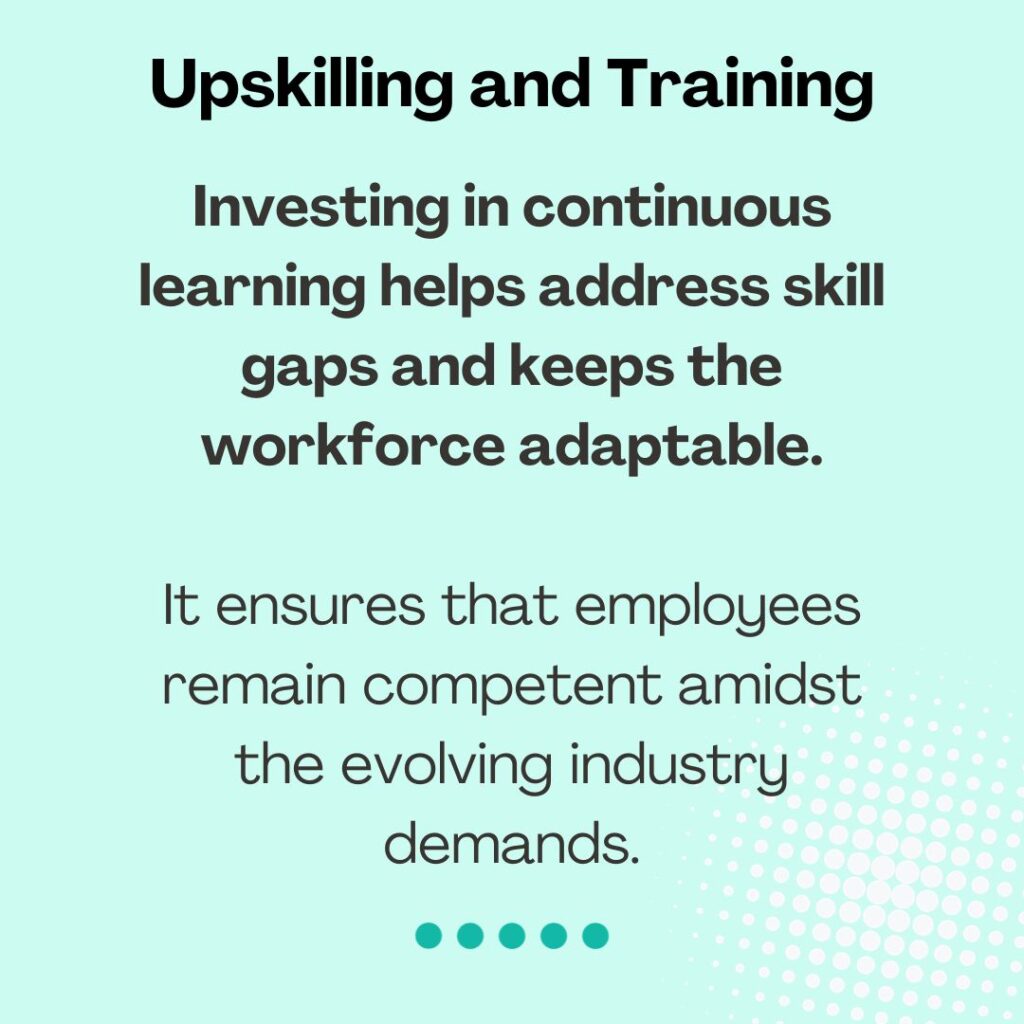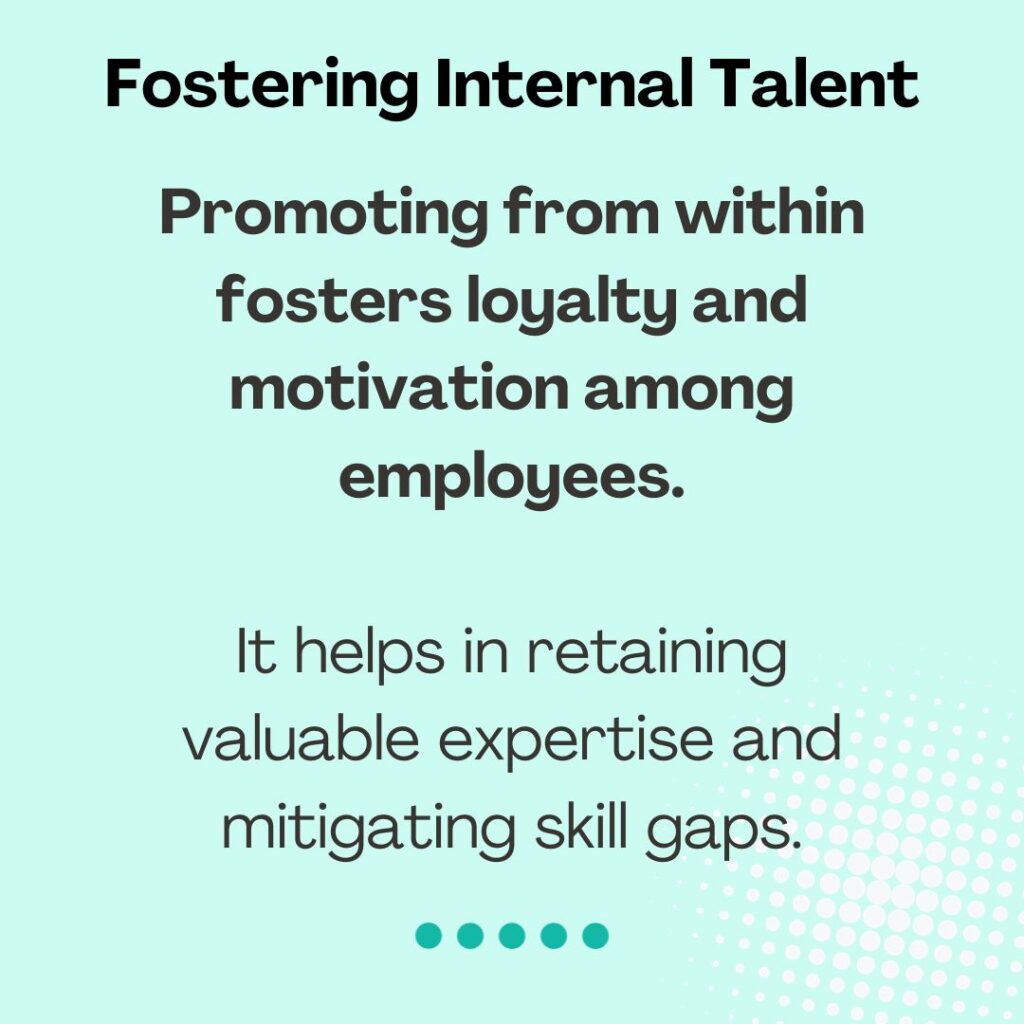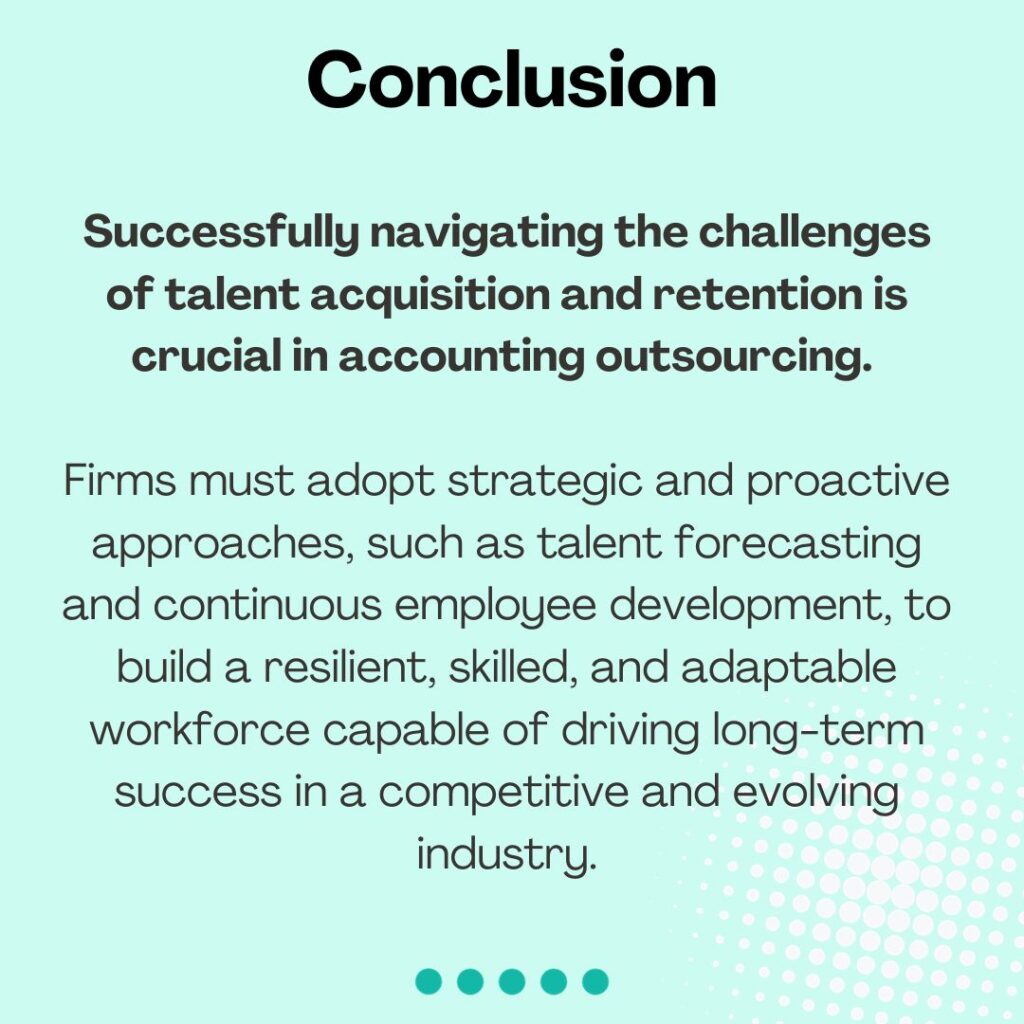The Manpower Challenge for Accountancy Firms
In the fiercely competitive landscape of accounting outsourcing, talent acquisition, and retention have emerged as critical challenges for firms seeking to maintain a competitive edge. As the demand for outsourced financial services continues to grow, accounting firms must develop effective strategies to attract top talent and ensure a skilled and engaged workforce.
4 Talent Acquisition Challenges Accounting Outsourcing Firms Face
The talent acquisition challenge encompasses several critical aspects that require strategic navigation and proactive measures. Firstly, the rise in outsourcing popularity has led to increased competition among firms vying for a limited pool of top accounting talent. Large accounting firms and technology companies often lure candidates with enticing packages, career growth opportunities, and diverse client portfolios, making it challenging for smaller outsourcing firms to compete for the best candidates.

Secondly, the landscape of accounting and finance is rapidly evolving, fueled by technological advancements and changing industry requirements. The traditional roles of bookkeeping and compliance are no longer sufficient to meet the dynamic needs of clients. As businesses demand more comprehensive financial insights, data analytics, advanced software expertise, and strategic financial advisory, the talent requirements have undergone a significant shift.
Another aspect of the challenge lies in the scarcity of qualified accounting professionals, particularly in specialized fields. The industry faces a shortage of skilled candidates who possess the expertise to tackle complex financial scenarios and offer strategic guidance to clients. As outsourcing firms endeavor to cater to diverse client demands, the limited supply of specialized talent poses a significant obstacle to finding the right professionals for specific roles.

Here are 4 ways in which this challenge impacts accounting outsourcing firms:
Increased Competition:
As more firms embrace outsourcing, competition for top accounting talent intensifies. Big accounting firms and tech companies often lure candidates with attractive packages and opportunities for growth, making it challenging for smaller outsourcing firms to compete.

Changing Skill Requirements:
The evolving landscape of accounting and finance demands a diverse skill set that goes beyond traditional bookkeeping and compliance. Candidates with expertise in data analytics, advanced software, and financial advisory are in high demand, leading to talent shortages in these areas.

Talent Shortages:
The accounting industry faces a shortage of qualified professionals, especially in specialized fields. This shortage poses a significant challenge for outsourcing firms seeking to find skilled candidates to meet clients’ diverse needs.

Remote Work Expectations:
In the wake of the pandemic, candidates now expect flexible work arrangements. Accounting firms must adapt to this shift in expectations to attract and retain top talent.

Did You Know?
- The global accounting outsourcing market is expected to reach $51.5 billion by 2026, according to a report by Markets and Markets.
- A study by the Outsourcing Institute found that businesses can save up to 40% by outsourcing their accounting functions.
- A study by Deloitte found that businesses that outsource their accounting functions are more likely to meet their financial goals.
Retaining Top Accounting Professionals
Confronting the talent acquisition challenge necessitates a strategic approach to talent attraction and recruitment. Beyond traditional recruitment methods, accounting outsourcing firms must devise innovative and attractive offerings to stand out in the competitive talent market. Competitive compensation packages, clear career growth pathways, a supportive work culture, and opportunities for continuous learning and development are crucial elements in drawing the attention of sought-after candidates.
Talent Poaching:
Larger accounting firms and competitors may attempt to poach top talent from outsourcing firms with enticing offers and growth prospects. Retaining talent requires proactive measures to engage and recognize employees’ contributions.
Career Development:
Providing continuous learning and development opportunities is crucial for talent retention. Offering training programs, mentorship, and certifications enables employees to advance their careers within the firm.
Employee Recognition and Rewards:
Recognizing and rewarding employee achievements and contributions fosters a sense of appreciation and loyalty. A well-structured recognition program can motivate employees to stay committed to the firm.
Supportive Work Environment:
Cultivating a supportive and inclusive work environment is essential for employee satisfaction and retention. Encouraging open communication, teamwork, and work-life balance contributes to a positive workplace culture.
4 Ways to Mitigate Future Workforce Challenges
The Talent Acquisition Challenge extends beyond short-term talent acquisition goals; it has significant implications for the firm’s long-term success and ability to deliver exceptional client services. Acquiring top accounting talent lays the foundation for sustainable growth, client satisfaction, and maintaining a reputation for excellence.
By addressing this challenge head-on and embracing strategic talent acquisition practices, accounting outsourcing firms can build a skilled and dedicated workforce that forms the backbone of their continued success in the dynamic and ever-evolving accounting landscape. Here are a few ways in which accounting outsourcing firms can mitigate challenges arising out of talent and skill gaps among their workforce:
Talent Forecasting:
Accounting outsourcing firms must forecast future talent needs based on industry trends, technology advancements, and client demands. Identifying potential skill gaps helps firms prepare and plan for future workforce needs.

Upskilling and Training:
Investing in employee upskilling and training programs enables the firm to address skill gaps proactively. Continuous learning ensures employees remain competent and adaptable to emerging industry demands.

Fostering Internal Talent:
Promoting from within the firm fosters loyalty and motivation among employees. Identifying and nurturing internal talent for leadership positions can mitigate skill gaps and retain valuable expertise.

Collaborating with Educational Institutions:
Forming partnerships with educational institutions can provide accounting outsourcing firms with early access to emerging talent. Engaging with academia allows firms to shape curricula to align with their specific skill requirements.

Conclusion
In the competitive landscape of accounting outsourcing, talent acquisition, and retention are pivotal factors for a firm’s success. Attracting top talent requires competitive compensation packages, career growth opportunities, work-life balance, and a showcase of firm culture.
By employing the above-listed mitigation strategies, accounting firms can forecast their talent needs more effectively, ensuring they have the right talent in place to meet future challenges and deliver exceptional client services. Proactive talent forecasting enables firms to stay ahead of the competition, build a skilled and engaged workforce, and achieve sustained growth and success in the dynamic accounting industry. All in all, this can ensure that accounting outsourcing firms have a skilled and engaged workforce, giving them a competitive edge in the market and sustaining long-term growth and success.



